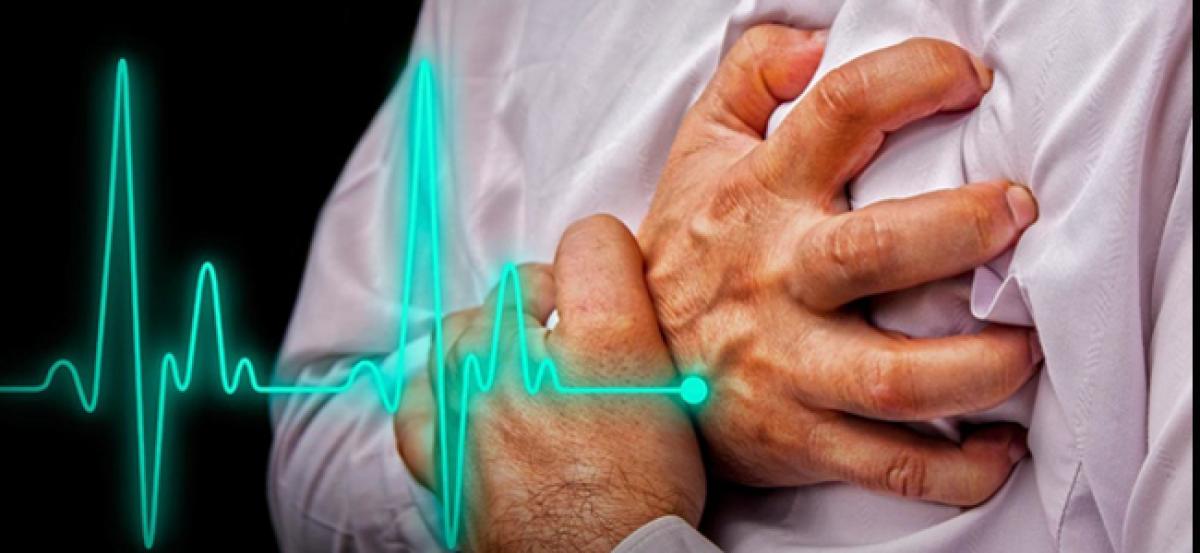Live
- Boxing Day Test Weather Forecast: Rain Delays Expected on Day 3 and Day 4 in Melbourne
- Baby John Twitter Reviews: Varun Dhawan Impresses, but Fans Feel the Remake Lacks Theri's Charm
- Pakistan Air Strikes Kill 46 in Afghanistan, Taliban Confirms Amid Rising Tensions
- ACB Launches Investigation into Formula E Races Held in Hyderabad Last Year
- Mega Job Mela in Madhapur on December 28: Explore Employment Opportunities in Hyderabad
- New Mizoram Guv likely to take charge next week
- Barroz 3D Movie Review: A Visual Treat for Mohanlal Fans, Mixed for Others
- Donate Blood, Save Lives: BJP Hosts Mega Blood Donation Camp in Aiza
- Azerbaijani Airliner Crashes Near Aktau, Kazakhstan: 32 Survive, Over 30 Feared Dead
- Union Minister Bandi Sanjay Kumar to Visit Jogulamba Gadwal District on December 27, 2024
Just In

The main causes of heart failure are blockages in the blood vessels supplying blood to the heart leading to heart attacks, weakness of the heart muscles either because of unknown reasons or because of some infection, drugs, diabetes, etc.; high blood pressure is also one of the main causes of heart failure
New Delhi: Heart failure may be a serious health hazard but not life-threatening like a heart attack, health experts say.
"Heart failure refers to the heart's inability to circulate blood through the body. Blood flow is slower than normal, which compromises the blood flow to the vital organs of the body like kidneys, liver and brain leading to the malfunction of these organs," Subhash Chandra, Chairman, Cardiology, BLK Super Speciality Hospital, New Delhi, told IANS.
Heart failure is not similar to a heart attack and it is important for people to understand the difference, the experts said.
"Heart failure refers to the condition wherein the blood pumping capacity of the heart is reduced. Heart attack is secondary to blocked coronary circulation. Blood supply to muscles of heart is cut or drastically reduced," Salil Shirodkar, Interventional Cardiologist at Mumbai's Nanavati Super Speciality Hospital, told IANS.
According to the experts, two types of heart dysfunctions can lead to heart failure -- systolic heart failure and diastolic failure.
Systolic heart failure is the most common cause of heart failure and occurs when the heart is weak and enlarged and the muscle of the left ventricle loses some of its ability to contract or shorten, whereas diastolic failure is when the muscle becomes stiff and loses some of its ability to relax.
As a result, the affected chamber has trouble filling with blood during the rest period that occurs after each heartbeat.
Heart failure is caused by many conditions that damage the heart muscle, including coronary artery disease (CAD), heart attack, cardiomyopathy disease of a heart muscle.
"The main causes of heart failure are blockages in the blood vessels supplying blood to the heart leading to heart attacks, weakness of the heart muscles either because of unknown reasons or because of some infection, drugs, diabetes, etc.; high blood pressure is also one of the main causes of heart failure," Vishal Rastogi, Head of Department, Heart Failure Clinic, Fortis Escorts Heart Institute, told IANS.
Heart failure can also occur with heart defects present at birth or congenital heart defects.
"Children with congenital heart defects often have slower growth and development and they may be smaller than other children of the same age. They may also have life-long problems with learning difficulties," Shantala Vadeyar, Group Medical Director, Department of Fetal and Maternal Medicine, Cloudnine Group of Hospitals, Mumbai, told IANS.
Early symptoms of heart failure are fatigue and shortness of breath. These affect daily activities such as walking, climbing stairs or carrying groceries.
The warning signs associated with heart failure includes acute shortness of breath, coughing or wheezing, accumulation of excess fluid in body tissues, tiredness, fatigue, nausea, lack of appetite and an elevated heart rate.
"Basically your heart tries to compensate for its lack of strength by beating more often to help deliver a sufficient amount of blood to your tissues and organs," Chandra explained.
However, heart failure can be prevented by having proper diet, daily exercise, swimming, jogging, adequate sleep, and minimizing stress and tension.
Diabetic or hypertensive patients should be more careful; they should always take the medications as prescribed by the doctor.
"As of now there's no known cure for heart failure, but there are steps that can be taken to prevent a weak heart from getting weaker," Chandra said.
"Controlling hypertension, regular medical follow-up with doctors, non-smoking and alcohol consumption in moderation and lifestyle modifications with an effective mix and match of diet, along with daily exercise, are the key to preventing heart failure," Shirodkar added.
For children with congenital heart defects, it is not all bad news, as some of these defects may be treatable.
"Many congenital heart defects (CHD) can also be treated and children can lead a normal life. It is important that CHD should be detected in the developing baby so that doctors can counsel parents to help them prepare for possible outcomes and surgical interventions," Vadeyar said.
Surgery may also sometimes prevent further damage to the heart and improve its functioning.
By Vivek Singh Chauhan
(Vivek Singh Chauhan can be contacted at [email protected])

© 2024 Hyderabad Media House Limited/The Hans India. All rights reserved. Powered by hocalwire.com







